What are the…
Messianic prophecies
Introduction
“Messiah” means “Anointed One”
Biblical prophecy specialists Peter and Paul LaLonde have noted that:
The Old Testament includes about 60 different prophecies, with more than 300 references, of the coming of the Messiah. It was through the fulfillment of these prophecies that Israel was told she would be able to recognize the true Messiah when He came. The 4 gospels record several times when Jesus said that He was fulfilling a prophecy of the Old Testament. Luke 24:27 records, for example,
“And beginning at Moses and all the prophets, he expounded unto them in all the scriptures the things concerning himself.”
And verse 44 notes,
“And he said unto them, These are the words which I spake unto you, while I was yet with you, that all things must be fulfilled, which were written in the law of Moses, and the prophets and the psalms, concerning me.”
—Peter and Paul LaLonde, 301 Startling Proofs & Prophecies (Niagra Falls, Ontario, Canada: Prophecy Partners, Inc., 1996).
Jesus Christ himself said,
“For if you believed Moses, you would believe Me; for he wrote about Me” (John 5:46 NKJV).
Likewise, Christ’s closest companions, His disciples confirmed and taught that He fulfilled all Old Testament prophecy about the Messiah (e.g., Acts 3:18; 17:2-3; 1 Corinthians 15:3-4).
Partial list of prophecies about the Messiah
-
A prophet like Moses
This was prophecied by Moses, himself:
“The LORD your God will raise up for you a Prophet like me from your midst, from your brethren. Him you shall hear, according to all you desired of the LORD your God in Horeb in the day of the assembly, saying,
‘Let me not hear again the voice of the LORD my God, nor let me see this great fire anymore, lest I die.’
And the LORD said to me:
‘What they have spoken is good. I will raise up for them a Prophet like you from among their brethren, and will put My words in His mouth, and He shall speak to them all that I command Him. And it shall be that whoever will not hear My words, which He speaks in My name, I will require it of him’.” —Deuteronomy 18:15-19 NKJV
Fulfillment—
Like Moses, the prophecied Messiah would be…
- a leader
- a prophet
- a lawgiver
- a deliverer
- a teacher
- a priest
- an anointed one
- a mediator
- a human and one of God’s chosen people (a Jew) performing the role of intermediary between God and man—speaking the words of God
More similarities…
- Like Moses, the Messiah would offer himself to die for the sins of the people.
- Both Moses and Jesus performed many miracles to validate their message from God.
- Moses lifted up the brazen serpent to physically heal all his people who had faith;
Jesus was lifted up on the cross to spiritually heal all who would have faith in Him. - As infants, both their lives were threatened by evil kings,
and both were supernaturally protected from harm. - Both spent their early years in Egypt.
- Both taught NEW truths from God.
- Both cured lepers (Num 12:10-15; Matthew 8:2-3).
- Both confronted demonic powers.
- Both were initially doubted in their roles by their siblings.
- Moses appointed 70 elders to rule Israel (Numbers 11:16-17);
Jesus appointed 70 disciples to teach the nations (Luke 10:1, 17). - …and there are many other parallels between the lives of Moses and Jesus
-
The Messiah would be a descendant of Noah’s son, Shem.
Noah said,
“Blessed be the LORD God of Shem; and Canaan shall be his servant. God shall enlarge Japheth, and he shall dwell in the tents of Shem; and Canaan shall be his servant.” —Genesis 9:26-27
Fulfillment—
Lineage from Shem to King David, a legal ancestor of Jesus Christ—
Noah → SHEM → Arpachshad → Shelah → EBER (founder of the Hebrew race) → Peleg → Reu → Serug → Nahor → Terah → Abraham → Isaac → Jacob → Judah → Perez → Hezron → Ram → Amminadab → Nahshon → Salmon → Boaz → Obed → Jesse → KING DAVID—a legal ancestor of JESUS CHRIST through both his mother Mary and his legal father Joseph.Chapter 10 lists descendants of Shem, noting that he was ancestor of Eber (Heber: Luke 3:35), the founder of the Hebrew race.
Noah associated Shem especially with the worship of Jehovah, recognizing the dominantly spiritual motivations of Shem and thus implying that God’s promised Deliverer would ultimately come from Shem. The Semitic nations have included the Hebrews, Arabs, Assyrians, Persians, Syrians and other strongly religious-minded peoples.
…Shem was peculiarly His [God’s] steward with respect to the propagation of God’s will and plan for mankind, especially the transmission of His saving Word. (Henry M. Morris, The Defender’s Bible)
-
More specifically, he would be a descendant of Abraham (a descendant of Shem).
Genesis 22:18; Gen. 12; Gen. 17; Gen. 22
Fulfillment— see Christ’s genealogy in Matthew 1.
-
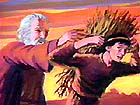 Learn more about the Abraham and Isaac in our God’s Story section.
Learn more about the Abraham and Isaac in our God’s Story section.More specifically, he would be a descendant of Abraham’s son, Isaac, not Ishmael
Fulfillment— see Christ’s genealogy in Matthew 1.
-
More specifically, he would be a descendant of Isaac’s son, Jacob, not Esau.
Genesis 28; 35:10-12; Numbers 24:17Fulfillment— see Christ’s genealogy in Matthew 1.
-
More specifically, he would be a descendant of Judah, not of the other 11 brothers of Jacob.
Fulfillment— see Christ’s genealogy in Matthew 1.
-
More specifically, he would be a descendant of the family of Jesse in the tribe of Judah
Fulfillment— see Christ’s genealogy in Matthew 1 and Luke 3:23-38.
-
More specificially, he would be of the House of David
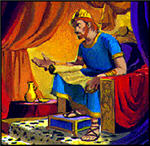
2 Samuel 7:12-16; Jeremiah 23:5; Psalm 89:3-4
Fulfillment— see Christ’s genealogy in Matthew 1; Luke 1:27; 1:32; 1:69. Note: Since the Jewish genealogical records were destroyed in 70 AD, along with the destruction of Jerusalem and the Temple, it would not be possible for a Messiah imposter who was born later to prove his lineage back to David and thus fulfill this prophecy.
-
He will be born in a small town called Bethlehem, specifically the one formerly known as Ephratah.
Fulfillment— Luke 2:4-20. Note: Christ’s birth in Bethlehem was apparently not by the choice of Mary and Joseph; it was forced upon them by Caesar Augustus’ taxation decree which required Joseph to leave his home in the city of Nazareth and return to his place of origin to pay the tax.
-
He will be born of a virgin.
Isaiah 7:14
-
The Messiah would be the “seed of a woman” come to destroy the work of the Devil.
Not long after Creation, God prophecied to the serpent Satan,
“And I will put enmity between you and the woman, And between your seed and her Seed; He shall bruise your head, And you shall bruise His heel” —Genesis 3:15 KJV
The implication was that Eve’s descendant would undo the damage that Satan had caused.
The “seed of the woman” can only be an allusion to a future descendant of Eve who would have no human father. Biologically, a woman produces no seed, and except in this case Biblical usage always speaks only of the seed of men. This promised Seed would, therefore, have to be miraculously implanted in the womb. In this way, He would not inherit the sin nature which would disqualify every son of Adam from becoming a Savior from sin. This prophecy thus clearly anticipates the future virgin birth of Christ.
Satan will inflict a painful wound on the woman’s Seed, but Christ in turn will inflict a mortal wound on the Serpent, crushing his head. This prophecy was fulfilled in the first instance at the cross, but will culminate when the triumphant Christ casts Satan into the lake of fire (Revelation 20:10).
This primeval prophecy made such a profound impression on Adam’s descendants that it was incorporated, with varying degrees of distortion and embellishment, in all the legends, mythologies and astrologies of the ancients since they are filled with tales of mighty heroes engaged in life-and-death struggles with dragons and other monsters. Mankind, from the earliest ages, has recorded its hope that someday a Savior would come who would destroy the devil and reconcile man to God. (Henry M. Morris, The Defender’s Bible)
In the New Testament, Christ’s apostle John confirms that this was His Master’s purpose, “He who does what is sinful is of the devil, because the devil has been sinning from the beginning. The reason the Son of God appeared was to destroy the devil’s work” (1 John 3:8). (Also see: Hebrews 2:14; Revelation 20:10.)
-
He will be a priest after the order of Melchisedek (Melchisedec).
Psalm 110:4
Fulfillment— Hebrews 5:6 (see: Melchizedek)
-
The scepter shall not pass from the tribe of Judah until the Messiah comes.
In other words, He will come before Israel loses its right to judge her own people. The patriarch Jacob prophecied this:
The sceptre shall not depart from Judah, nor a lawgiver from between his feet, until Shiloh come; and unto him shall the gathering of the people be. (Genesis 49:10)
As Dr. Henry M. Morris’ The Defender’s Bible explains:
This important prophecy has been strikingly fulfilled. Although Judah was neither Jacob’s firstborn son nor the son who would produce the priestly tribe, he was the son through whom God would fulfill His promises to Israel and to the world. The leadership, according to Jacob, was to go to Judah, but this did not happen for over 600 years. Moses came from Levi, Joshua from Ephraim, Gideon from Manasseh, Samson from Dan, Samuel from Ephraim and Saul from Benjamin. But when David finally became king, Judah held the scepter and did not relinquish it until after Shiloh came. “Shiloh” is a name for the Messiah, probably related to the Hebrew word for “peace” (shalom) and meaning in effect, “the one who brings peace.”
According to the Jewish historian Josephus, the Sanhedrin of Israel lost the right to truly judge its own people when it lost the right to pass death penalties in 11 AD (Josephus, Antiquities, Book 17, Chapter 13). Jesus Christ was certainly born before 11 AD.
-
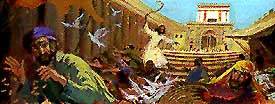
Click to learn more about the life of Jesus in our God’s Story section.
He will come while the Temple of Jerusalem is standing.
Malachi 3:1; Psalm 118:26; Daniel 9:26; Zechariah 11:13; Haggai 2:7-9
Fulfillment— Matthew 21:12, etc. Note that The Temple did not exist at certain periods in Jewish history, and it was eventually utterly destroyed in 70 AD, and still is destroyed
-
He will perform many miracles.
Isaiah 35:5-6
Fulfillment— See list of “Miracles Recorded in the Gospels”.
-
He will open the eyes of the blind.
Isaiah 29:18
Fulfillment— Matthew 9:27-31; Matt. 12:22; Matt. 20:29; Mark 8:22-26; Mark 10:46; Luke 11:14; 18:35; John 9:1-7.
-
He will speak in parables.
Psalm 78:2
Fulfillment— Matthew 13:34, etc.
-
The Gentiles will believe in Him, while His own people (the Jews) will reject him.
Isaiah 8:14; 28:16; 49:6; 50:6; 60:3; Psalm 22:7-8; 118:22
Fulfillment— 1 Peter 2:7, etc.
-
A messenger (a man of the wilderness) will prepare the way for Him.
Isaiah 40:3; Malachi 3:1
See John the Baptist (Matthew 3:1-3; Matt. 11:10; John 1:23; Luke 1:17).
-
Prophecied the exact day of His public revealment to Israel—and subsequent death
The precise timing of Jesus’ crucifixion was also given to the Jews when God revealed to the prophet Daniel (Dan. 9:24) how the Jews could calculate the day of the revealing of the Messiah. Talking of a 490 year period, the prophet foresaw that it would begin “from the going forth of the commandment to restore and build Jerusalem” (Dan. 9:25). In the book of Nehemiah we learn that this command was given “in the month Nisan [on the Hebrew calendar], in the twentieth year of the king” (2:1). The king was Artaxerxes Longimanus who ruled from 465 to 425 BC.
The prophet Daniel said that 483 years from that date, the Messiah would be revealed to Israel, but He would then “be cut off, but not for himself” (9:26). This prophecy refers to the crucifixion when Jesus died, or was cut off, for the sins of the world.
Fulfillment—
483 years later, to the day, was Sunday, April 6, 32 AD On that day, which we commemorate as Palm Sunday, Jesus rode into Jerusalem on a donkey and revealed Himself as Israel’s Messiah. He was killed four days later, thus fulfilling the prophecy that He would be revealed and then slain. [Peter and Paul LaLonde, 301 Startling Proofs & Prophecies (Niagra Falls, Ontario, Canada: Prophecy Partners, Inc., 1996).]
Click to learn more about Jesus in our God’s Story section. -
He will enter Jerusalem riding a donkey—the colt of an ass.
Zechariah 9:9
Fulfillment— Matthew 21:5; Luke 19:32-37
-
He will be hated for no just reason.
Psalm 69:4
Fulfillment— John 15:25
-
He will be betrayed.
Psalm 41:9
Fulfillment— Matthew 27:3-10.
-
More specifically, He will be betrayed by a friend.
Psalm 41:9
Fulfillment— Matthew 27:3-10; Matt. 26:47-48.
-
The price of his betrayal will be 30 pieces of silver.
Zechariah 11:12
Fulfillment— Matthew 27:3-10.
-
The betrayal money will be cast onto the floor.
Zechariah 11:13
Fulfillment— Matthew 27:5.
-
More specifically, it will be cast onto the floor of the Temple.
Zechariah 11:13
Fulfillment— Matthew 27:3-10.
-
The betrayal money will be used to buy a potter’s field.
Zechariah 11:13
Fulfillment— Matthew 27:6-10.
-
He will not open his mouth to defend Himself.
Isaiah 53:7
Fulfillment— Matthew 27:12.
-
Click to learn more about the betrayal and death of Jesus in our God’s Story section.
He will be beaten and spit upon.
Isaiah 50:6
Fulfillment— Matthew 26:67; 27:26-30.
-
He will be “numbered with the transgressors.”
Isaiah 53:12
Fulfillment— Jesus was crucified as a criminal in between two thieves (Mat 27:38).
-
He will be pierced.
Zechariah 12:10
Fulfillment— John 19:34
-
Both His hands and feet.
Psalm 22:16; cf. Zechariah 12:10; Galatians 3:13
-
Crucifixion foretold
Psalm 22 graphically prophecies the Messiah’s manner of death. At the time the psalm was written (and long after), the penalty for blasphemy was stoning.
Fulfillment— However, at the time Jesus was condemned by the Sanhedrin, it no longer had the legal right to put people to death. Thus, the case was taken to the Roman governor Pontius Pilate who crucified him according to Roman custom (see: Crucifixion).
-
The Jewish Passover sacrifice and Jesus Christ’s sacrificial death coincide exactly.
Fulfillment—
The dates on which Jesus was taken by the Roman authorities, and then slain, also coincided precisely with the Jewish Passover. Jesus became the Passover Lamb, “without blemish.” At the first Passover, described in Exodus 12, God instructed the Israelites to kill a lamb with no blemishes and to put its blood on their door posts. When the angel of death passed through Egypt where the Israelites were being held as slaves, it would pass by any house that had the blood of the a Passover lamb on its door posts. Jesus fulfilled Moses’ prophecy of the Passover Lamb because it is through His blood that we can be saved from, or passed over by, death. [Peter and Paul LaLonde, 301 Startling Proofs & Prophecies (Niagra Falls, Ontario, Canada: Prophecy Partners, Inc., 1996).].
-
His bones will not be broken.
Psalm 34:20—Exodus 12 states that the Passover lamb’s bones are not to be broken.
Fulfillment— see: John 19:33
-
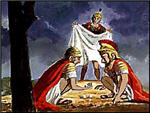
Click to learn more about the betrayal and death of Jesus in our God’s Story section.
They will divide his clothing and cast lots for them.
Psalm 22:18
Fulfillment— John 19:23-24
-
He will be given vinegar and gall to drink.
Psalm 69:21
Fulfillment— Matthew 27:34, 48.
-
He will say: “My God, my God, why hast thou forsaken me?”
Psalm 22:1
Fulfillment— Matthew 27:46.
-
He will be buried with the rich.
Isaiah 53:9
Fulfillment— Matthew 27. According to Henry Morris,
This passage [Isaiah 53:9] could also be read, “they planned His grave (to be) with the wicked, but it was with a rich man [Joseph of Arimathea] in His death.” —Henry M. Morris, The Defender’s Bible
-
He will not decay after death.
Psalm 16:10
Fulfillment— Acts 2:31
-
He will be resurrected from the dead.
Psalm 16:10
Fulfillment— Acts 2:31, etc. See: “Resurrection of Christ”.
-
He will ascend into heaven.
Psalm 68:18
Fulfillment— Acts 1:9.
-
He will be seated at the right hand of God.
Psalm 110:1
Fulfillment— Hebrews 1:3.
-
He will be the Son of God.
Psa. 2:7
Fulfillment— Matthew 3:17, etc.
Is Jesus Christ a man, or is he God? Answer
If Jesus is God, how could he die? If Jesus died on the cross, then how can he be alive today? Answer
Was Jesus Christ God, manifest in human form? Answer
Is Jesus Christ really God? Answer
If Jesus was the Son of God, why did He call Himself the Son of Man? Answer



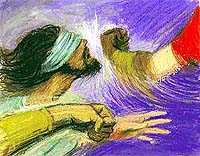
 About JESUS CHRIST—Answers to frequently-asked-questions
About JESUS CHRIST—Answers to frequently-asked-questions What is a prophet in the Bible? and who is one?
What is a prophet in the Bible? and who is one?